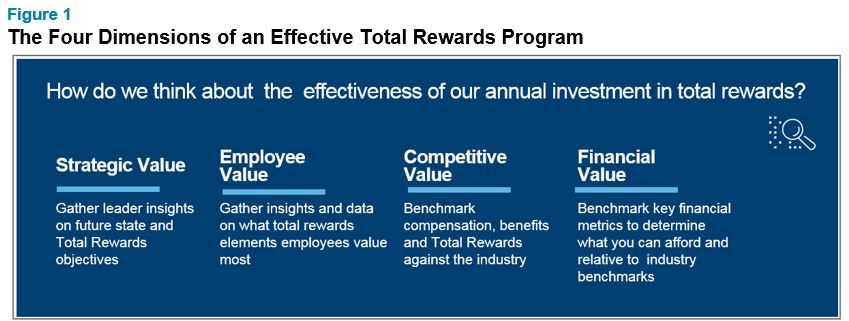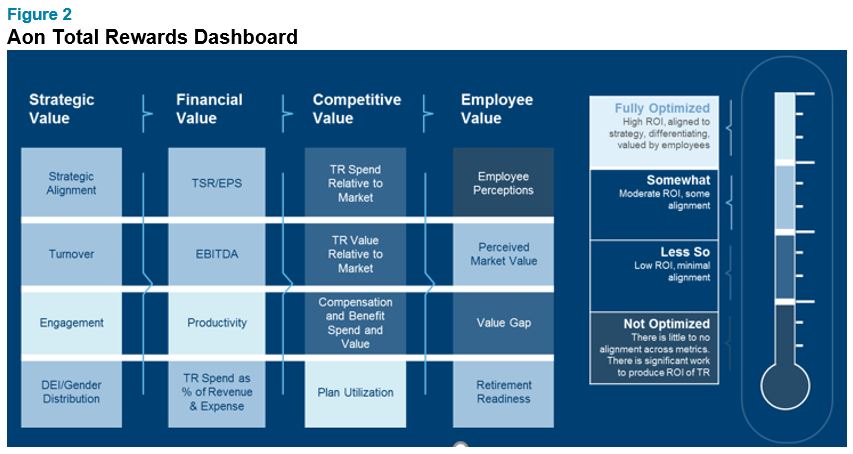In a recent webcast, Aon’s employee rewards experts Brooke Green and Dave Kompare discussed how rewards need to change in a post-pandemic world and why change might not be as hard as some organizations fear.
Before the COVID-19 pandemic, the workforce was already undergoing significant change that compelled organizations to rethink their total rewards programs. Wellness plans were generally deemed insufficient; a rise in gig workers triggered a debate about workplace benefits and protection; and many firms across industries were engaged in a race to offer more generous compensation packages for workers with hot technical skills. These challenges, in addition to others, were deepened by the pandemic.
Rethinking rewards will require organizations to make tough decisions, but the initial steps are fairly straightforward and can have a significant impact on the effectiveness of an organization’s total rewards programs, according to Aon’s partners and employee rewards experts Brooke Green and Dave Kompare. The pair recently spoke about total rewards optimization and the biggest priorities for rethinking rewards in a post-pandemic world during a webcast hosted by WorldatWork (click here to listen to a replay).
As organizations prioritize changes to their rewards to facilitate remote working, a greater focus on inclusion and diversity, and creating a more agile and resilient workforce (to name just a few), companies should take the time to incorporate employee feedback and ensure the value of rewards offerings are being widely communicated.
During the early weeks of the pandemic last year, Aon surveyed more than 2,000 workers in the United States (U.S.) and found widespread concern over financial security, health benefits and caregiver support. However, survey data showed employees were equally concerned about who they could go to at their employer for questions related to these topics. “It wasn’t just rewards programs that were a concern but how they were being communicated throughout the pandemic. Did they have someone they could turn to with questions?” remarks Kompare. “The pandemic has heightened awareness about how effective companies are at communicating their rewards programs,” he adds.
More than a quarter (28%) of respondents to the survey said they felt there was too little communication on HR issues from their employers. Employees that reported getting the information they needed from their employers were more likely to feel secure in their job and have greater trust in their employer.
Just as rewards professionals are customizing plans to meet the different needs of their employees, communications strategies should also be segmented. “Not everyone is in the same mindset or situation about how they want to be communicated to or what matters most to them,” says Green. That’s one of the reasons why it’s so important to pulse workers for what they value in their rewards, she says.
We have worked with clients whose employees don’t feel their rewards are competitive with the market, but when we conduct a benchmarking analysis, we find they actually are competitive with their peers, notes Kompare. “Sometimes organizations will over-rotate on the competitive value and the one area that really gets missed is employee value and finding out what employees want.”
“It’s important to know what your employees think about how competitive your rewards are, because employees are making decisions based on their perception of what they are receiving,” Kompare adds.
While employee input weighs heavily on the effectiveness of rewards, there is no single metric or measure that a company should rely on. Aon evaluates its clients’ effectiveness across four dimensions: strategic value, employee value, competitive value and financial value. Figure 1 outlines the key activities associated with each dimension of value.

Once this data is obtained, it’s important to bring meaning to the findings in order to inform next steps. Aon’s Total Rewards Dashboard (see Figure 2) includes specific metrics to help assess the return on a firm’s investment in total rewards. The dashboard pulls organizational and market-based metrics to quantify and track the effectiveness of total rewards over time.

As mentioned above, the goal of optimizing rewards is to ensure programs are delivering on key objectives in a changing world, including enabling remote or hybrid working models, allowing for agile ways of working, building a more resilient workforce and supporting inclusion and diversity efforts (e.g., pay equity, hiring from diverse talent pools). Ninety-two percent of recent survey respondents[1] are revisiting their remote work policies as part of their Future of Work priorities; 85% are revisiting inclusion and diversity as well as agile ways of working.
“Once companies have developed a go-forward roadmap for optimizing their rewards, they can begin to marry that work with their top future of work priorities,” notes Aon’s Green.
If you’d like more information about the topics discussed in this article or our survey data, please reach out to one of the authors or write to rewards-solutions@aon.com.
[1] Aon COVID-19 HR Pulse Survey: The Future of Work is Now, conducted in December 2020 with 1,484 respondents worldwide